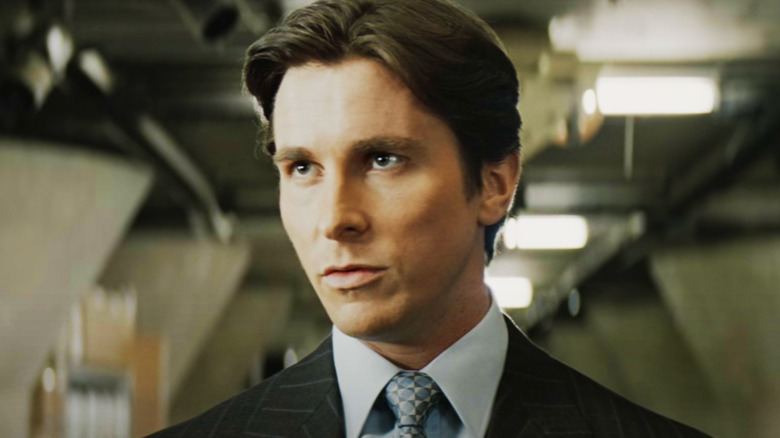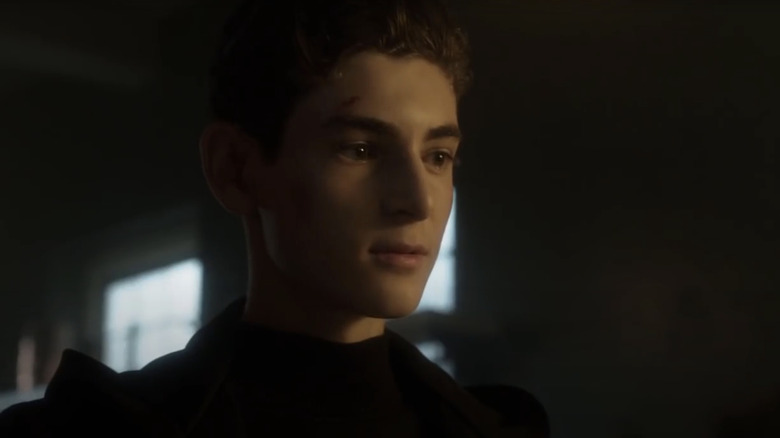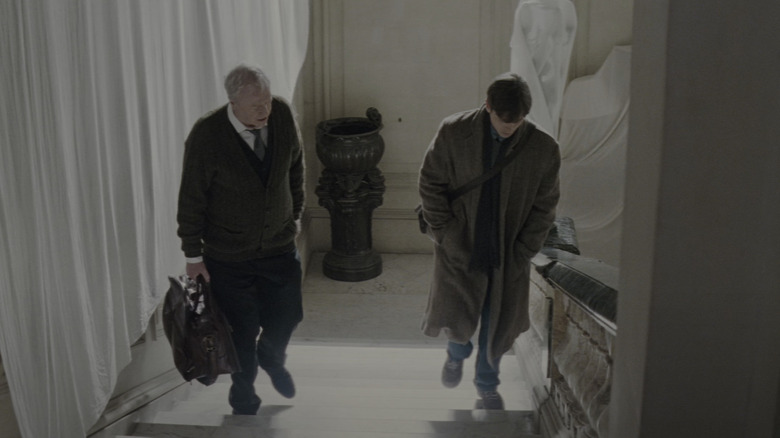A Canceled DC TV Show Could Have Changed How Modern Audiences View Batman
In 2014, Fox debuted its Batman prequel series "Gotham," giving fans a look at a pre-Dark Knight Bruce Wayne (played by David Mazouz) as he navigated life in the wake of his parents' death. But "Gotham," which wrapped up in 2019, wasn't the first time somebody had tried to produce a Batman prequel show. Back in the late '90s, "The Iron Giant" writer Tim McCanlies pitched an idea for a series called "Bruce Wayne," in which we would have followed the young orphan in the years prior to his becoming the legendary hero.
The unrealized "Bruce Wayne" project sounds as if it would have satisfied fans looking for a more serious take on the iconic character's early years. That said, it wasn't as if "Bruce Wayne" was going to be as grounded and cerebral as Christopher Nolan's "Batman Begins." The show initially was set to air on The WB, which had otherwise seen success with series aimed squarely at teen audiences like "Buffy the Vampire Slayer." Still, anticipation for the show was high at the time, and fans were eager to gain a glimpse into what McCanlies termed the title character's "missing years."
In 1999, the writer pitched his idea to Tollin/Robbins Productions, the company responsible for such beloved children's TV fare as "Kenan & Kel," "The Amanda Show," and "Smallville" (more on that later).
What would have happened in the Bruce Wayne series?
After Tollin/Robbins Productions reacted positively to the "Bruce Wayne" idea, Tim McCanlies delivered a 63-page draft for the "Bruce Wayne" pilot (which eventually leaked online). Dated November 1999, the script finds Bruce on the cusp of his 18th birthday. After he and Alfred Pennyworth return to Gotham following a 10-year absence, Bruce is dismayed to find that his city has descended into a swamp of crime and corruption, which extends all the way to the police force, where a certain Det. Jim Gordon remains the young Wayne's only ally in law enforcement.
Bruce does have another Gothamite in his corner, however, in the form of a young Harvey Dent, who at the time is studying corporate law and whose sister, Susan Dent, becomes a love interest for Bruce. Reporter Vicky Vale is also in the mix, alongside psychology student Harleen Quinzel, which would have made this one of the earliest post-"Batman: The Animated Series" appearances of Harley Quinn outside of the seminal series on which she debuted.
Alongside his pilot script, McCanlies also produced a show bible, which gave a thorough insight into how the first and subsequent seasons would play out. It seems Alfred would act as a narrator, recalling the events of each installment in his memoirs. There were plans to bring in other well-known names from the Batverse, too, including Selina Kyle, Jack Napier, and one Clark Kent, who would meet Bruce at a conference of high school journalists. We also would have seen Bruce becoming more interested in criminality, spending time at Arkham Asylum, and even beginning combat training. By the end of the first season, he discovers what will eventually become the Batcave below Wayne Manor.
Alas, none of this intriguing series — which was set to cover a five-to-six-year period in Bruce's life — was ever realized. The show was abandoned amid uncertainty about the future of the movie franchise, which at the time was in a rough place post-1997's "Batman & Robin."
What happened to the Bruce Wayne series?
Had Tim McCanlies been able to realize his vision of a teen drama Batman series, we would have seen Bruce Wayne's Batman origin story told in detail, with the young Gothamite even working for the Gotham City Police Department and the FBI before deciding to take on the mantle of the Dark Knight to carry out his one-man assault on criminality. Unfortunately, none of it ever came to be.
In 2000, following the show's abandonment, IGN posted a review of the pilot script, noting how an internal "struggle within Warner Brothers" between the film and TV divisions was seemingly to blame for the series' demise. According to IGN, which praised the pilot script for "treating its characters and source material with a greater reverence than the last few Bat-movies," Warner Bros. was worried that a Batman TV show would distract from the long-gestating fifth movie in the franchise. At the time, WB was reportedly working on an adaptation of Frank Miller's "Batman: Year One" comic book storyline, and a Bruce Wayne origin story was seen as perhaps treading on the toes of such a project.
Something did come out of "Bruce Wayne," however: A planned episode in which Clark Kent arrived in Gotham was ultimately used as the basis of the "Smallville" series, which followed the same premise of following a teen Clark in his pre-hero days. That show proved incredibly successful for The WB (and the network to which it later moved, The CW), running for 10 seasons between 2001 and 2011. Even after "Bruce Wayne" had been shelved, "Smallville" producers Alfred Gough and Miles Millar reportedly tried to introduce a Bruce Wayne character to their series, only to be told to scrap the idea by Warner Bros. and its movie execs.
Would "Bruce Wayne" have been as big a hit as "Smallville?" It's obviously impossible to say, but it is interesting to think about what might have happened had this show been greenlit. Would Christopher Nolan have successfully reinvigorated the Dark Knight with "Batman Begins"? Would "Gotham" have ever been a thing? Indeed, would this alternate timeline even include the Matt Reeves-verse, which gave us the well-received Batman spin-off "The Penguin"? We may never know.


